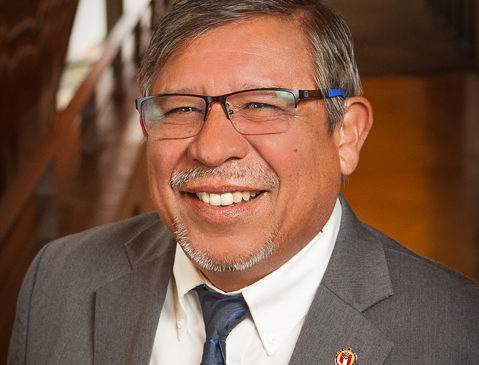Pio Renteria: ‘We are going to come out of this really strong’
Tuesday, January 5, 2021 by
Aiden Snasdell Austin City Council was forced to overcome many setbacks during 2020, but Council Member Pio Renteria said he was encouraged that he and his colleagues made strides on their efforts to help the city’s most vulnerable populations.
After shifting gears to address a variety of pandemic concerns, Renteria said he took particular pride in adding more affordable units in his district and elsewhere in the city.
“My dream has always been to do as many affordable housing units (as possible) in my district,” said Renteria.
Among his highlights for 2020, Renteria noted the new housing units started in the Rebekah Baines Johnson Center and Chalmers Courts. Both buildings were created to bring more affordable housing options to those in need.
One woman at Chalmers Courts left a special impression on Renteria. She had tears streaming down her face “when she saw that for the first time in her life she’s going to have her own restroom, her own bedroom and two other rooms for her kids,” he said. “She just couldn’t believe it.”
Renteria also noted Council’s efforts to combat rising costs by finally implementing the Homestead Preservation Act, which promotes home ownership and helps prevent the loss of homes for low-income families.
“My goal is to keep as many people that grew up around here, and for those that are getting older, to be able to afford to stay here and live here and not have to move out,” he said.
That goal became especially critical with the onset of the pandemic, which put more immediate affordability and welfare concerns in front of Renteria and his colleagues on Council. The city used some of the money from the CARES Act to help Austinites pay their rent and stay in their homes.
“There’s nothing scarier than getting evicted out of your place, and for no fault of your own,” Renteria said. “Most of these people are from the hospitality business or restaurants. So they’ve been really affected by the pandemic.”
Renteria said along with helping people pay their rent, Austin allocated some of the CARES money to the Central Texas Food Bank. Due to the pandemic, the food bank has needed to buy 10 times more food than in previous years.
“We gave the food bank about $2.5 million so that they could go out and buy food,” he said. “So we could feed the people that are in desperate need of food.”
The city sought similar adjustments for its residents experiencing homelessness, already a major concern for Council before the pandemic. The city had plans to create more transitional housing units for homeless people, Renteria said, but those plans changed when many Covid-19 infections showed up in the homeless population.
Rather than turn hotels into transitional housing to get people off the street, he said, Council turned them into places where Covid patients could safely rehab and isolate. Housing large communities in consolidated buildings was not an option this year.
Although the pandemic delayed or upended several initiatives, Renteria believes the city’s initiatives during the pandemic were beneficial to the community. “It’s investing a lot of the money in our people,” he said, “and we are going to come out of this really strong.”
Those investments will also help enhance some major initiatives that weren’t as affected by the pandemic, Renteria said, particularly the voters’ approval of Project Connect and mobility bonds that will reshape transportation in the city.
“We’re going to be creating 5,000 jobs over there in East Austin,” Renteria said about the transit, housing and other development projects. “We need a lot of jobs here. Especially with the many people getting laid off. So that’s one of our biggest accomplishments.”
One of Renteria’s next priorities will include a new pedestrian bridge by the Longhorn Dam to improve public safety.
After serving six years, Renteria has just two years left on his term. Looking forward, he hopes to see other young Council members carry out his legacy.
“If they are successful,” he said, “I know Austin will be successful.”
This story was written by a journalism student at the University of Texas at Austin. The Austin Monitor is working in partnership with the UT School of Journalism to teach and publish stories produced by students in the City and County Government Reporting course.
The Austin Monitor’s work is made possible by donations from the community. Though our reporting covers donors from time to time, we are careful to keep business and editorial efforts separate while maintaining transparency. A complete list of donors is available here, and our code of ethics is explained here.
You're a community leader
And we’re honored you look to us for serious, in-depth news. You know a strong community needs local and dedicated watchdog reporting. We’re here for you and that won’t change. Now will you take the powerful next step and support our nonprofit news organization?








